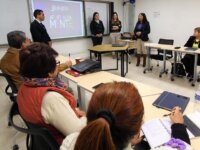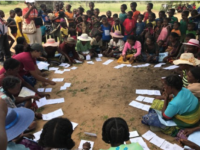Cash transfers, recognized as one of the most effective tools in social protection, are expanding rapidly into the world’s poorest economies. As these programs support more of the world’s most vulnerable populations, they face growing demands to increase their effectiveness. Light touch interventions from behavioral science help make programs more adaptive to the psychological phenomena that influence beneficiaries’ decisions and actions and improve outcomes at little additional cost.
Innovation Tag: Behavioural Insights
Governments have increasingly adopted remote work due to COVID19. So far, there has been no comparative assessment of how teleworking has affected the public sector. The People in Government Lab, together with an international team of researchers from 12 universities is running a study in Brazil, Colombia, Chile, and the United Kingdom to understand the organisational advantages of teleworking, and to evaluate how behavioural sciences can improve public employees’ wellbeing and performance
High-tech Research Infrastructures (RIs) require large budgets, high operating costs and extensive human resources, making them available only to a small number of prominent researchers. Up-and-coming junior researchers or technical staffs from SMEs, who account for the majority of technology development, are therefore not able to utilise expensive RIs. The South Korean government planned and established the national RIs governance system to solve this issue and fairly allocate opportunities for…
Impact Canada is a whole-of-government effort that deploys outcomes-based policy and program approaches. It features a novel set of rules, processes, and supports to allow the Government of Canada to support innovative methods like challenges, pay-for-success funding, and behavioural insights, which previously faced significant barriers to adoption. Through these systems-level changes, the Government can now apply these approaches to produce better outcomes for citizens and create greater public
Surviving family members of unexpected deaths (accidents, murders, suicide) are often ill equipped to process pain, cope with daily functions, fulfill social roles and maintain health. Finding one's own spiritual resources in such crises can be immensely helpful. This pilot program integrates spiritual support responses into Israel’s Ministry of Labor & Social Affairs’ Sudden Loss and Bereavement Centers and targets parents in order to build and enhance family resilience and well-being.
A growing number of challenges face the province from an aging population and growing debt to successive one-term government and a disengaged public service. Given these challenges, there is a growing consensus in the public service that change is needed despite organizational structures and behaviours that favour the status quo. As a result, GNB’s “Innovation and Design services” has evolved to help public servants become better problem solvers and move towards a more human-centred…
Mi Taxi, My Cab, part of Mexico City’s App, was created to boost trust in the public cab network by making the service safer. It provides information about the drivers and the cabs' public concessions. Users can rate the trip and activate a panic button connected to the City’s Intelligence Agency, C5.
Negative perceptions of safety among the public lead the Government to grasp the situation faced by drivers and users, particularly women, and thus developed the initial phase of the app,…
Case Study
Nudging Mexico City drivers into feeling co-responsible for everyone’s safety: a new license…
Taking a course and a comprehensive driving test has not been a mandatory requirement to issue a driver's license in Mexico City and implementing such a system is not simple. The City is building institutional capabilities to effectively implement mandatory courses and tests to improve road safety. Meanwhile, SEMOVI has modified the issuing license form to nudge applicants into feeling co-responsible for road safety and refraining from driving if they deem themselves incapable of doing it…
Case Study
Fotocívicas: Changing Fines for Community Work and Educational Penalties to Improve Drivers’…
Fotocívicas is a behaviourally inspired traffic control system that relies on educational and civic fines aiming to transform drivers’ behaviour by reducing recidivism and licensing effect among offenders. It sets out to change the previous system, which was based on monetary fines with cameras placed where drivers were more prone to speed, not where more fatalities happened, without improving behaviours or road safety
Case Study
AFORTUNADA MENTE® Gamification. A scalable tool that develops financial and socio-emotional…

Mexicans' financial capabilities are below the average of G-20 countries, worsening their quality of life: 68% say "money is for spending", consequently 65% live from hand to mouth (OCDE, 2017).
AFORTUNADA MENTE is a didactic board game for children, families and entrepreneurs to develop financial and socio-emotional capabilities. It's intuitive, agile and ludic, and promotes personal development and social impact through the game's challenges.



